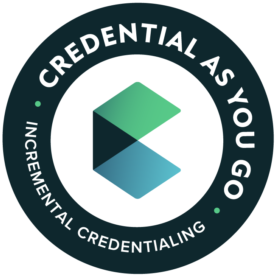This playbook is designed for all audiences, regardless of their experience with incremental credentialing. Whether you have just heard of incremental credentialing or already participated in or developed an incremental credentialing program, this playbook will serve as a guide, presenting up-to-date information, valuable insights, emerging practices, and recommendations.
Guidance and resources are provided for stakeholders who are committed to advancing DEI in incremental credentialing. Wherever you are in your DEI efforts, it is essential to develop a shared understanding of the key DEI terms and concepts. By establishing a common language and framework for discussing and addressing diversity, equity, and inclusion, we can better collaborate and work to create more inclusive and equitable learning environments.
The current political climate has prompted calls for major changes in DEI policy. At least two dozen bills were introduced in 15 states in 2023—all seeking to undo DEI efforts at higher education institutions. In some states, colleges and universities are rolling back their DEI programs in anticipation of policy changes. Others are moving their DEI operations into student success units. Even the term “DEI” is being reconsidered in light of policy changes.
Throughout this playbook, you will encounter various DEI-related terms and concepts. While some of these terms may be familiar, others may be new to you or require further explanation. Our hope is that this playbook will not only provide practical guidance for advancing DEI in incremental credentialing but also serve as a resource for developing a common language and framework for discussing and addressing DEI in postsecondary education and in workforce development. We encourage you to approach this playbook with an open mind and a willingness to engage with these important issues.
Consider where you sit on the social identity spectrum in the United States. Do you identify as male or female? Did you grow up in a suburban, middle-class neighborhood, as a member of a nuclear family? Are you an able-bodied American with a four-year college degree? Reflect on the various ways your identities become visible or more keenly felt at different times. Consider the ways in which your identities may affect how others perceive or treat you.
Inequities are shaped by a wide range of identities and social factors. These factors include age, education level, immigration status, ability status, race and ethnicity, religion, place of residence, income and other economic conditions, wealth and resources, occupation, gender identity, sexual orientation, and experiences of trauma and adversity. Privilege works to normalize some identities over others. In higher education, inequities exist in who has access to postsecondary learning, who completes postsecondary programs, and the value placed on various learning models. Despite the growing variety in programs of education and skill development, the four-year degree is still the best indicator of economic mobility. Addressing inequity requires a contextual approach that considers local factors, specifically the unique histories, culture, available infrastructure, and assets within a given area.
Understanding your own social identity can be a powerful tool when working to advance DEI in incremental credentialing. Taking time to reflect on your beliefs can help you challenge assumptions about what constitutes valid student learning, participation, engagement, and time on task. Being aware of your own social identity and how it intersects with other identities can help you cultivate a greater awareness of your own biases, assumptions, and perspectives. This can give you a fuller, more objective understanding of your decision-making processes, your interactions with others, and your problem-solving approaches. When you are mindful of your own biases, you can work to overcome them and create more inclusive learning environments that benefit all learners.

Credential As You Go has acquired three phases of funding to date. Lumina Foundation funded Phase I, resulting in the Incremental Credential Framework for testing. The Institute of Education Sciences, U.S. Department of Education funds Phase II (Grant R305T210063), which focuses on rapid prototyping of and research on incremental credentials with a national campaign. An anonymous private donor fund at the Program on Skills, Credentials & Workforce Policy at George Washington University funds the development of the prototype Learn and Work Ecosystem Library. Walmart funds Phase III, which focuses on systems change for expansion and sustainability of incremental credentials. The opinions expressed are those of the authors and do not represent views of Lumina Foundation, Institute of Education Sciences, the U.S. Department of Education, Walmart, or George Washington University.